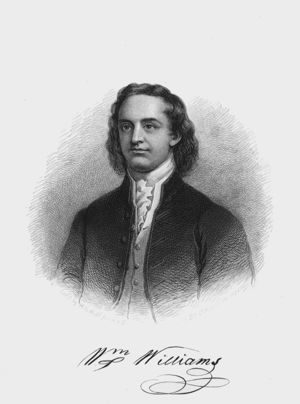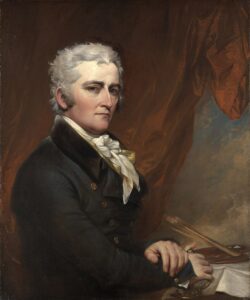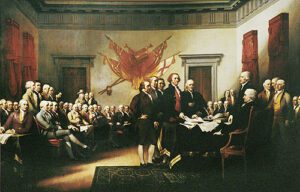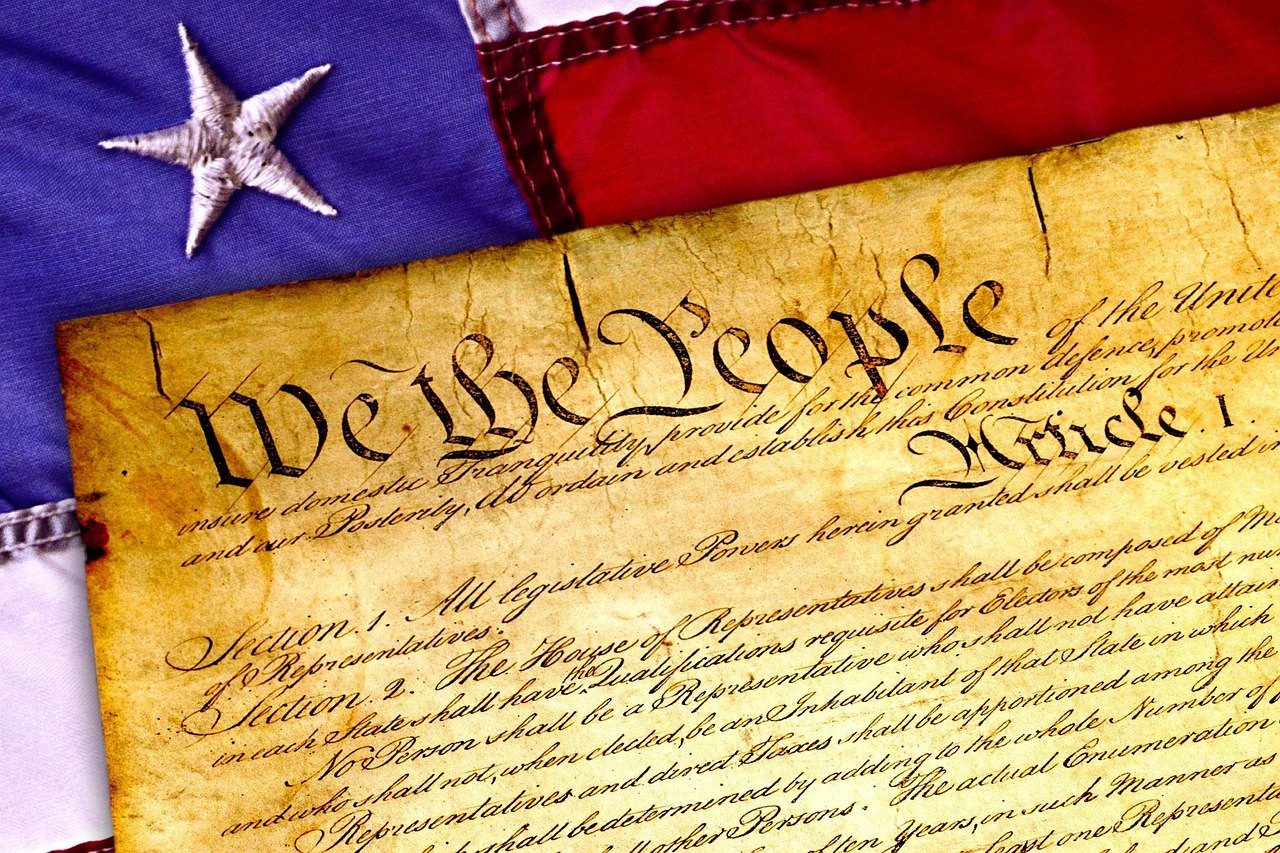
ILR. William Williams was a signer of the Declaration of Independence from Connecticut. He studied theology and law at Harvard with the intention of becoming a pastor but volunteered to fight in the French and Indian War. After the war he became a merchant and a politician. He signed the Declaration of Independence. He also assisted in framing the Articles of Confederation but was not a signer. Williams held state and local level offices for over 40 years and was a lifelong church deacon.
William was born on 18 April 1731 in Lebanon, Connecticut. He was the son of Pastor Solomon Williams and Mary Porter Williams. His father and grandfather both attended Harvard College and were ministers of the Gospel. His father was pastor of the Congregationalist Church in Lebanon for at least 50 years.
Following his father and grandfather, William enrolled at Harvard at age 16 and graduated four years later. He planned to enter the ministry but enlisted to fight in the French and Indian War (1754-1763). He joined his uncle, Colonel Ephraim Williams in a military expedition to the Lake George area in northeast New York.
On 8 September 1755 British Major General William Johnson commanding 1,200 provincial troops engaged the French in a fierce battle. Colonel Williams commanded a regiment and at the first volley was killed by a shot through the head. Colonel Williams had made a will providing funds for a college that would become Williams College in Williamstown, Massachusetts.
After his military service, William returned to Lebanon with a contempt for British Army officers in general. He found them to be arrogant and to openly regard colonists as “inferior.”
William chose to open a store in Lebanon and to become a pastor. He was an excellent businessman and prospered as a merchant. William’s life took an important turn in 1756 when he was elected Town Clerk, a position he held until 1796. He was a Lebanon Selectman from 1760 to 1785. He held a seat, and many positions in the Connecticut Assembly for 45 years.
On 14 February 1771, William Williams married 25-year-old Mary Trumbull. Mary and William had three children who all survived childhood.
Mary was the daughter of Royal Governor Jonathan and Faith Robinson Trumbull. Governor Trumbull was the only Royal Governor that supported independence and he held the office of governor until 1784. He also served as the second Speaker of the United States House of Representatives.

Mary’s brother was John Trumbull, an artist who became famous as the painter of the Revolution. His works include the four large paintings that hang in the Rotunda of the US Capitol.
William was a passionate advocate of independence and supported his passion financially and by authoring in alias many articles in the press. He was a member of the Sons of Liberty and helped compose many of the Revolutionary state papers issued by Governor Trumbull.
In the Connecticut Assembly, Williams supported the 1769 boycott of all British goods to oppose the Townshend Tax Acts and the British occupation of Boston. He was critical of merchants who began to ignore the boycott after repeal of the Townshend Acts except for the tax on tea. He never trusted those merchants again.
Williams served on committees that responded to the Stamp Tax, Connecticut claims to the Susquehanna lands, the case of the Mohegan Indians, and settlement of the boundary disputes between Connecticut and Massachusetts.
On 1 July 1774, following enactment of the Coercive Acts by Parliament (known as the Intolerable Acts by Americans) Williams authored an article “To the King” from “America” in the Connecticut Gazette. This article was a scathing attack on the King and mocked the King.
Between 1773 and 1775 Williams was a colonel in the Connecticut Militia. In 1775, he went door to door to solicit funds to pay the cost of sending Connecticut troops to aid in the capture of Fort Ticonderoga.
Williams served as Probate Judge for the Windham District from 1775 to 1809 and Judge of Windham County Court from 1776 to 1805. As if he didn’t have enough to do, in June 1776, the Assembly appointed him a delegate to the Second Continental Congress to replace Oliver Wolcott who was ill.
On 12 August, Williams wrote to Wolcott saying he “did not arrive in Philadelphia until near the last of July, after the most Sultry & fatiguing journey I ever performed, by much. The city has been since I came & yet is the most uncomfortable Place that I ever saw….” The summer of 1776 was extremely hot and humid in Philadelphia and Williams was not used to such weather.

William did not arrive in Philadelphia in time to debate the Declaration of Independence nor to vote on it. He did arrive in time to sign the Declaration in August, becoming a Founding Father.
On 10 August, William wrote to one of his brothers-in-law, Joseph Trumbull, about the nasty politics of appointing additional general officers to the Continental Army. General Washington had stated he needed the officers for a complete command structure in future battles. Many were appointed and he listed them.
As the British prepared to land on Long Island, Williams wrote Trumbull expressing his hope for the Continental Army. “I hope … they & all will acquit themselves like men & be strong in the Day of approaching Conflict.”
After the crushing defeat of the Continental Army in the Battle of Brooklyn on 27 August 1776, Williams wrote Trumbull expressing his hopes and fears. He stated his faith in God and ended with “may God grant Our Officers & soldiers, great Wisdom, Understanding, Courage & Resolution.”
General Washington successfully evacuated Long Island after being trapped and William wrote Governor Trumbull lamenting the loss of cannon, but he believed the evacuation was necessary after the Continental losses. He mentioned that Congress decreed that New York City was not to be destroyed.
Williams admitted that the British held the advantage, that more setbacks would be experienced, and that many would die but that “I have always thot that this was a just and righteous cause in which we are engaged…” His trust in God never wavered.
Williams was a member of the Congressional committee to compose the Articles of Confederation and his letters to those in Connecticut contained information about the debates on the Articles, the duties and powers of government, and the colonies becoming states. William appeared to be satisfied with most decisions but noted that he did not agree with some, and that taxation was a very contentious issue.
Williams had been criticized by some for resigning his position of colonel in the 12th Connecticut Militia to accept his appointment to the Congress when the war began. In 1781, however, he demonstrated his courage when word reached him in Lebanon that a British force commanded by the traitor Benedict Arnold was attacking New London, Connecticut. William immediately mounted his horse and rode 23 miles in three hours to volunteer his services. The town had been lost and was in flames by the time he arrived.
During the winter of 1781, a French regiment was stationed at Lebanon. William and his family moved out of their home and turned it over to the French officers.
In 1788, William was a delegate to the Connecticut convention to consider ratifying the Constitution of the United States. William voted to ratify the Constitution but objected to the clause forbidding religious tests.

Following his service at the ratifying convention, Williams retired from national and state politics and continued his service as a county judge. However, in 1810 his oldest son, Solomon, died, and he never recovered from that loss. His health rapidly declined, and William Williams died on 2 August 1811 at 81 years old. He was buried at the Old Cemetery (now known as Trumbull Cemetery) in Lebanon. Mary died in 1831 and is buried next to William.
I could find no memorials of William Williams other than the Signer’s Monument in Washington, DC. This is sad since he gave nearly his entire adult life to our nation. He served in so many positions that it is difficult to understand how he had time to be a successful merchant. The man could have had little leisure time. He was involved in the independence and the establishment of our Republic. Remember William Williams. He was a true patriot.
